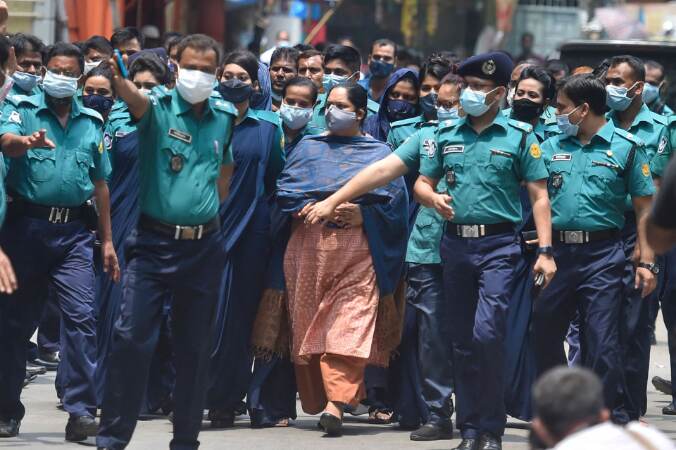Mutually ironic
While the Bangladeshi response thwarted the Chinese misconception of wooing the country, the detention of journalist Rozina Islam reflects a lacking tact

Dhaka witnessed two dramatic developments in the recent past. One was an indiscreet, undiplomatic statement made by the Chinese ambassador to Bangladesh, Li Jiming. The envoy's unsavoury and controversial remarks stirred the Sino-BD relations when he on May 10, while addressing the Diplomatic Correspondents Association of Bangladesh (DCAB) at a virtual meeting, warned Bangladesh not to join the quadrilateral alliance QUAD (a group comprising the US, Australia, Japan and India) as the country may incur the wrath of China, adversely affecting the bilateral ties between the two nations. This uncalled-for remark led to the build-up of anger in the Bangladesh establishment. BD Foreign Secretary, Masud Bin Momen was quick to summon the Chinese ambassador. Li Jiming did retract by resorting to usual tactics of hiding behind "quotes out of context" or "facts have been distorted" rhetorics.
To do quick damage control, the Chinese Foreign Ministry held a hurriedly convened media meet in Beijing in the aftermath of this faux pas and straightened the creases to say that Bangladesh and China were on top of the bilateral relations and that alleged misread statement from the Chinese Ambassador wouldn't allow the existing ties to sour. However, the statement has already caused the damage and the perceived firefight was far from convincing. Meanwhile, credible reports state that Chinese vaccine Sinopharm is underway to combat spiralling COVID cases in Bangladesh.
China and Bangladesh watchers are finding it quite intriguing that the Chinese Ambassador chose this timing to vent his thoughts on QUAD and that too on Bangladeshi soil? It's felt that China was, and perhaps still is, overconfident with its bonhomie with Bangladesh with a slew of investments and gestures towards the country amid a misconception that China has been successfully wooing BD to drive a wedge between India and BD. This is, however, far from reality. Having said this, it's pertinent to state that there is a powerful pro-China lobby in Dhaka, and there are endless business houses that are preferring China-made anti-COVID vaccines than the ones manufactured in India. China has always been cultivating the pro-China elements in BD to use them to wean the country away from India. Ironically, the pro-China lobby in Bangladesh has conveniently forgotten that China had collaborated with Pakistan to thwart the liberation struggle of Bangladesh which was made possible by India's all-round support. While India, Bhutan, USSR, Yugoslavia etc. were the first to accord recognition when Bangladesh emerged as a new independent nation, China waited, and waited till 1975, full three years before it recognised the entity of Bangladesh. Moreover, when Bangladesh is currently celebrating the 50th year of its independence, people should condemn in more stronger terms the Chinese interference. This was clearly a strong-arm tactic, and the tenor of the statement was possibly to preempt BD to join the alliance under the influence of the US.
The second-most significant happening in Dhaka in the most recent times is the arrest (May 17) of Bangladeshi investigative journalist Rozina Islam who as a Prothom Alo (a very popular Bangla daily with a huge readership) reporter had gone to the Health Ministry to ascertain some facts for her scoop. However, the ministry officials grew suspicious and wrongfully confined her in the Ministry premises for over five hours before taking to the local Shahbagh Police Station. At the time of this piece going to the press, Rozina is charged under the provisions of the 100-year-old colonial-era Official Secrets Act (OSA) and is currently in prison. The entire journalistic fraternity in Bangladesh has unequivocally condemned the arrest and questioned the propriety of the government to arrest a popular scribe of her stature. Questions are also being asked as to what did the authorities do to her for over five hours at the Health Ministry premises? Many are alluding that torture or coercive measures were also used to extract information as she was allegedly found tampering with a file to access some classified information. So far, the government hasn't responded convincingly and criticism continues to mount. Now there is considerable questioning of the health ministry in an apparent bid to highlight charges of corruption against it, particularly towards the purchase of healthcare equipment including PPE kits and lifesaving medicines. Such scathing attacks targeting the government is unlikely to show any abatement in the ongoing criticism against the arrest of Rozina Islam.
Bangladeshi government could act with more tact and discretion than entering into a direct confrontation with the media community. So far, its stance has been non-reconciliatory, adopting a 'couldn't care less' attitude. This is unlikely to work and perhaps shows an authoritarian position. Undoubtedly, law needs to take its own course but, many times, better and practical judgment and wisdom play a decisive role. Perhaps that's missing. The country is fighting the menace of Covid, and only a couple of months ago, Hefazat-e-Islam wreaked havoc with terrible bearing on the communal and law-and-order scene. Adding one more problem, when the plate is already full, doesn't appear to bode well. Prothom Alo and Daily Star are prominent newspapers that shape public opinion in Bangladesh to a very large extent. Also, these twin papers are objective in their coverage, they are fair, progressive and secular and seldom go against the establishment. Ruffling their feathers, as seen in the Rozina case, might create temporary irritants for the government.
The writer is a retired IPS officer, a security analyst and a former National Security Advisor to the PM of Mauritius. Views expressed are personal



